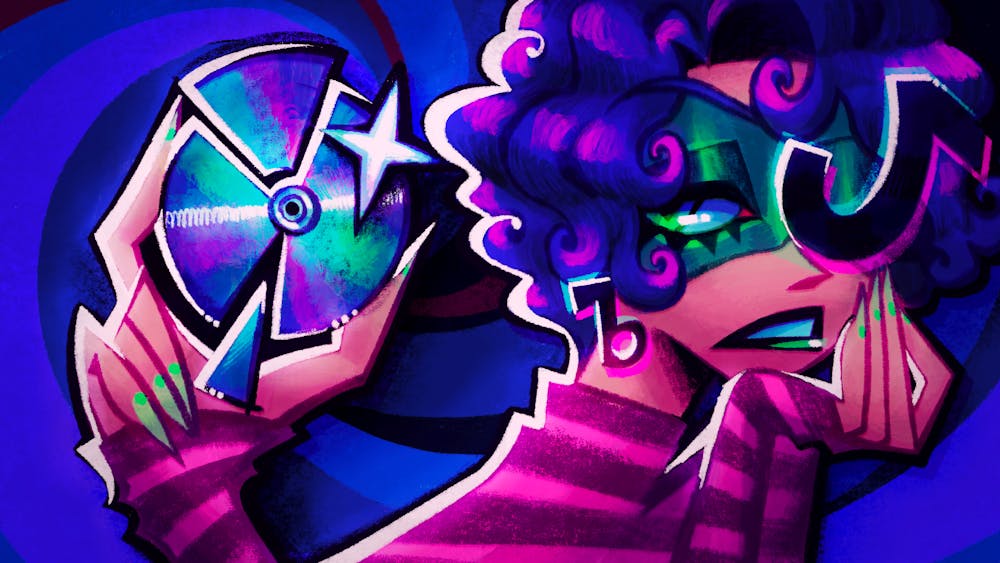Perched on top of her fridge with a bucket hat, cowboy boots, and an acoustic guitar, Adrianne Lenker, lead singer and songwriter of Indie–folk band Big Thief, belts out a verse from the band’s recent single “Vampire Empire,” an emotionally explosive track that details a toxic love gone bad like “expired milk.”
Swinging her boots, rocking back and forth to the rhythm with eyes closed, Lenker appears blind to the neurotic chaos that floods the TikTok comments. “GET DOWN FROM THERE AND GET IN THE STUDIO,” reads a comment with over three thousand likes. “I love big thief (you have 48 hours to release this)” says another amusing (but also ominous) comment. For over a year, the band has played the song live on their Dragon New Warm Mountain I Believe in You tour, and even performed it live on Colbert, which only added more fuel to the song’s flaming popularity as a TikTok sound.
Over the summer, fans overwhelmed the comments sections of each new social media post with desperate pleas for the song’s release. But when the song finally got an official release on July 19 this summer, fans were upset for another reason.
In the studio version, Lenker removes the lyrics “in a row” from the line, “I walked into your dagger for the last time in a row / It's like trying to start a fire with matches in the snow.” The rhyme is now gone. She also took out the line “I'm the fish and she's my gills” from the chorus, a TikTok audio favorite. The lyrical changes, along with new drums and the removal of a flute melody, caused a fight among fans either defending the studio version or hating it because of changes from the beloved demo. “Artists need to start understanding that their music isn't for them," says the onscreen text from a TikTok video by user @bubbledbongwater. "We pay for presales, we pay for tickets, we pay for your merch.”
With modern social media giving fans the ability to easily share and discuss unreleased music, “leak obsession” has created a toxic relationship between artists and fans, where fans now feel entitled to receive the music they want when they want it, regardless of the artist’s feelings.
Although leak obsession has now spread to all corners of music social media, the phenomenon is most well known as being associated with the online hip–hop community. Artists like Playboi Carti have a long history of leaked songs that have either never been released or were significantly altered before release. Over sixteen songs originally planned to appear on Carti’s 2020 album Whole Lotta Red, dubbed “v1” in online forums like r/playboicarti, were uploaded to the internet by leakers in the months following the release of Die Lit on May 11, 2018.
Because of the leaks, which like “Vampire Empire” gained a massive amount of plays through illegal streaming on sites like SoundCloud, Carti decided to scrap the entire album. When an almost completely new version of Whole Lotta Red was finally released two years later, on Christmas of 2020, fans, upset that they didn’t get the original version of the album, were quick to spread negative comments and declare the album “mid.” It wasn’t until months later when footage of Carti’s electric performance of the album at Rolling Loud went viral on YouTube that fans started to see past the leaks and respect Carti’s artistic vision for the album.
With leaks now posing a serious threat to the release and reception of albums, some artists like Travis Scott have started to fight back against leak culture. Before Scott released his highly anticipated album UTOPIA earlier this July, the rapper was photographed in multiple locations with his bodyguard handcuffed to a leather briefcase labeled “Utopia”—in this case, a hard drive storing the unreleased album. On a practical level, storing the album on a hard drive instead of in the cloud helps prevent online leaks, but the handcuffed briefcase also sends a clear message to fans: Travis Scott is in control. Among other examples, Scott’s UTOPIA rollout signals a growing desire among artists to take back control of their music in the age of internet leaks.
In an Instagram post accompanying the official release of “Vampire Empire,” Big Thief comments to their fans: “The live version you may prefer exists and now another version exists. We weren’t gonna go into the studio and try to replicate what we played on Colbert … plus there’s no way it would’ve been the same, because songs are vessels for the expressions of our present selves, and not highly manicured concoctions polished to be consumed based on demand.”
Fans need to understand that music is not just a commodity created for their enjoyment, but also an art and a means of self–expression, and artists should have control over how they express themselves, whether that means changing lyrics or releasing a song at a later time.
Social media algorithms, like TikTok, promote negativity to drive engagement, which creates consistently hate–filled comment sections. Growing tensions between artists and their fans are just one unfortunate side effect of this wider issue that is perpetuated by profit–seeking tech companies. Hopefully, in the future before they start an argument in the comments, fans will consider: Is this worth it? If they can learn to navigate social media, and understand that unreleased music is art in progress, then maybe artists and fans can have a less toxic relationship than the lovers in “Vampire Empire."

